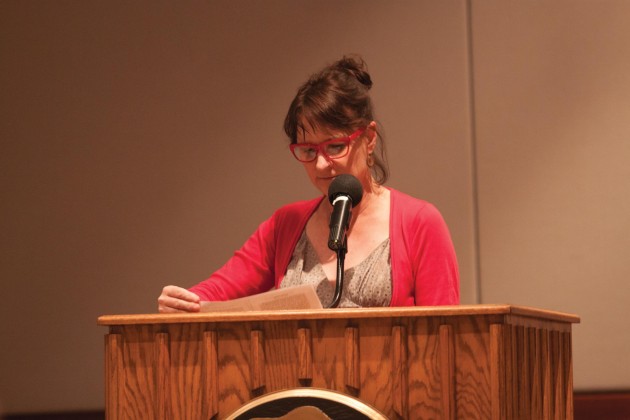
Antonya Nelson is used to teaching graduate students during the spring semester at the University of Houston.
However, upon accepting the Mary Rodgers Field Distinguished University Professor of Creating Writing, she has landed at DePauw, welcomed by a classroom full of eager undergraduate writing majors.
"It is a prestigious honor, and it's nice to work with advanced undergraduate creative writing students," Nelson said. "It seemed like a good thing for me."
The opportunity for Nelson to come to DePauw was made possible by a 2007 endowment from David Field, senior professor and professor emeritus of English at the time.
Nelson is teaching Modeling Fiction Writers, a 300-level writing workshop class for junior and senior English writing majors. In the class, students read and analyze short stories, focusing on certain writing strategies. In order to fully embrace the meaning behind the writers' works, the students are also compiling their own fictional short stories.
"I would be really happy if my students walk away from the class wanting to read more short stories and being able to appreciate the art form," Nelson said.
On the first day of class, Nelson asked her students to write three short anecdotes. The students worked in groups of three to figure out which story had the potential to be a semester-long project. Each week, the class reads short stories modeled after other stories, studying a certain aspect of the story before applying the lessons to their own work.
"I think it's a really complicated art form, and it's not readily as understood as other [literature] art forms," Nelson said.
Nelson is well established in the field, as an author of 10 works of fiction and a variety of personal essays. She has been published in several magazines, including The New Yorker. Her works also appeared in Best American Short Stories.
In 2000, she was awarded the Guggenheim Fellowship Award. Other awards include the National Endowment for the Arts and the Rea Award for Short Story. Although Nelson likes writing long stories, she prefers short stories.
"To me, revision is everything," Nelson said. "Ask any serious writer, 'How many stories have you written in the last four months?' They are not going to say three."
Peter Graham, an associate professor of English, said that before this semester, several members of the department created a list of writers they'd potentially want to teach a class, and Nelson was at the top of the list.
"She is one of the premier writers in the country," Graham said.
According to Graham, Nelson has brought more to campus than just the ability to teach well. She has also brought friendship.
"She is a fantastic writer, and a great colleague, and is very generous," Graham said. "I wish she could stay longer."
Matt Haeske, a junior English writing major, is taking Nelson's class as his first writing workshop.
"Before this class, I haven't been able to slave over one work the way a real author does," Haeske said.
Haeske really likes that aspect of the class, and thinks that taking the class has given him a big advantage.
"The sheer amount of peer editing I have been exposed to from a writer's point of view has been eye opening," Haeske said.
Lauren Reed, a senior English writing major, signed up for the class without prior knowledge of Nelson's work.
"She really challenges us to think of writing in new ways that I haven't thought of before," Reed said.
Reed said that Nelson is intelligent, creative and interesting, which inspires her for her own work.
"She makes you want to put forth your best effort in class," Reed said.
